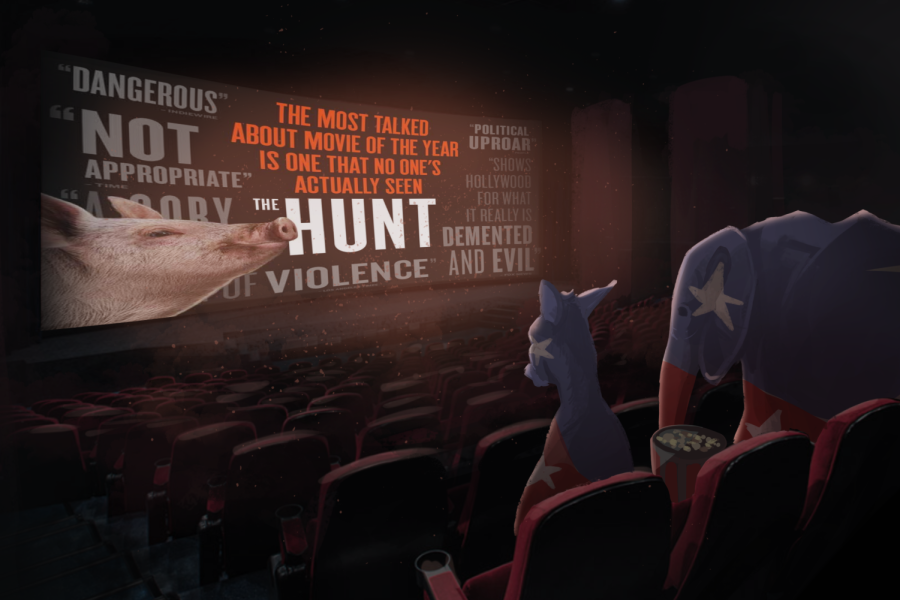Why political satire like “The Hunt” is more relevant now than ever
“The Hunt,” a 2020 horror and political satire film, uniquely illustrates the extent of America’s ideological divisions.
March 29, 2023
Political satires aren’t new. For the past century, they have dominated pop culture and media in the form of classic written works like “Animal Farm” to sketches on “Saturday Night Live.” Modern media’s tendency to make jokes about the extreme division of the world is the main attribute of their success. The creation of satirical media allows people to take a closer look at their priorities and try to bring them together instead of pushing them further apart.
“The Hunt,” a 2020 horror and political satire film, uniquely illustrates the extent of America’s ideological divisions. With the political tensions constantly rising throughout America as each side of the political spectrum fails to reach agreement, this film offers a sense of comedic relief from those real-world tensions, creating characters that fit within these political views and exaggerating their beliefs to create an action-packed comedy that jabs at both sides of the political spectrum.
As the film approached its theatrical debut, it drew backlash from former President Donald Trump and news outlets that denounced the themes the film promoted. Test screenings for the film claimed that the satire fell flat while others framed right-wing supporters as the butt of the jokes throughout the film.
The creative juices of Damon Lindelof, one of the main writers who is known for working on “World War Z”, seeped through the script onto the screen. The film features “GLOW” star Betty Gilpin as the main character of Crystal Creasy, a kidnapping victim who is made subject others to a cynical game of cat and mouse. The prey in the game take on stereotypical roles of far-right supporters, while the hunters take on far-left ideologies. Lindelof and co-writer Nick Cuse take the worst parts of both political parties and magnify them tenfold in a quirky, satirical fashion.
The theme makes several comparisons between the party differences within American politics now and slyly makes fun of the idea that both sides view the other as monsters. Stereotypes about each political party are continually spread by biased news outlets and pop culture satire, further dividing the public. Because of their political beliefs alone, leftist elitists label their prey as “deplorable,” while the Right labels leftists as “godless elites.” The two groups engage in continual bickering throughout the movie.
The audience doesn’t learn that the antagonist “Athena,” played by Hilary Swank, has mistaken Creasy for her far-right counterpart that shares the same name and is a next-door neighbor. Instead of the intended victim that Swank chose, they kidnapped Creasy, who happens to be a renowned war veteran as her victim, who proves difficult throughout the film to hunt down. The theme instantly becomes clear: people shouldn’t make assumptions about someone purely based on how they look.
There are standout details in this film — costume design and the interactions between characters. The names of antagonists Athena and Liberty are also clever; “Liberty” stems from the concept of freedom from an oppressive regime, but Liberty in this film portrays the “oppressive regime” as hunting down individuals for her entertainment. “Athena” refers to the Greek goddess of strategy and war, an unfitting name since Swank’s character tries to be tactical with her moves in this game of cat and mouse. But by the end, it’s Swank’s overconfidence that gets her killed.
The passion of the cast and crew is clear throughout the film, especially in their design of the final scene, but I felt as though this film fell short with its writing and characters. It felt simple, to put it plainly. I felt as though the message it was trying to convey was a strong concept that more people should discuss, but their execution of it was where it hurt the most. Along with the film’s inability to constantly find a way to entertain the audience outside of the action and minor moments of comedy is what I found boring somewhat.
While this film disappointed in terms of writing and overarching character development, it stands out in its practical effects — a form of visual tricks that are non-VFX, normally produced physically without the use of computers — and its hilarity. While this movie is a bit dated, its message is what maintains its prominence, especially with modern political tensions; don’t judge purely based on stereotypes or prejudices.









